DEANS LIST

DEANS LIST
Ten Strategies for College Success
JOHN BADER

2011, 2017 John Bader
All rights reserved. Published 2017
Printed in the United States of America on acid-free paper
9 8 7 6 5 4 3 2 1
First edition published in 2011 as Deans List: Eleven Habits of Highly Successful College Students, by John B. Bader
Johns Hopkins University Press
2715 North Charles Street
Baltimore, Maryland 21218-4363
www.press.jhu.edu
Library of Congress Cataloging-in-Publication Data
Names: Bader, John B., author.
Title: Deans list : ten strategies for college success / John Bader.
Description: Second edition. | Baltimore : Johns Hopkins University Press, 2017. | Includes bibliographical references and index.
Identifiers: LCCN 2016035062| ISBN 9781421422374 (pbk. : alk. paper) | ISBN 9781421422381 (electronic) | ISBN 1421422379 (pbk. : alk. paper) | ISBN 1421422387 (electronic)
Subjects: LCSH: Study skills. | College student orientation.
Classification: LCC LB2395 .B28 2017 | DDC 378.1/98dc23 LC record available at https://lccn.loc.gov/2016035062
A catalog record for this book is available from the British Library.
Special discounts are available for bulk purchases of this book. For more information, please contact Special Sales at 410-516-6936 or specialsales@press.jhu.edu.
Johns Hopkins University Press uses environmentally friendly book materials, including recycled text paper that is composed of at least 30 percent post-consumer waste, whenever possible.
To my sons, Calvin and Eli,
wishing them lives of exploration and adventure
ACKNOWLEDGMENTS
The first edition of this book was a project many years in the making, only becoming reality with the help of many supporters. I am grateful for the encouragement, frank feedback, and support of Ashleigh McKown at Johns Hopkins University Press. She saw real promise in the project, but that promise could not have been realized without her honesty. I also appreciate the exacting pen of copyeditor Carolyn Moser.
The project became a communal effort, an attempt at capturing collective wisdom, thanks to the advice and contributing essays of many colleagues at peer institutions. We started a yearly conference of these advising deans in 2007; and in 2008, many of them accepted my invitation to contribute to this book. I am most grateful to them all. For the second edition, their names and biographies appear in the books list of contributors.
I want to thank my former colleagues at Johns Hopkins University: Paula Burger, Dan Weiss, Steven David, Adam Falk, Richard Sanders, Karen Desser, Kathie Sindt, Ruth Aranow, Adriene Breckenridge, Jim Fry, Michelle Rodriguez, Janet Weise, Andrew Douglas, John Latting, Lori Citti, Ken Romaine, Steve Pomper, Jessica Madrigal, Liza Thompson, Bill Conley, Michael Mond, and Susan Boswell. Their wisdom, experiences, stories, and support run through every sentence I have written. I would have been helpless without my assistants at Johns Hopkins University, first Sydney Green and then Vicki Fitzgerald.
My greatest supporter for the second edition has been Greg Britton at Johns Hopkins University Press. Greg encouraged me to revisit and then strengthen the manuscript for a new group of students and parents. I have made it shorter, slimming it from 11 habits (itself a dated expression) to 10 strategies, and selecting a subset of the essays written from the first edition. Those essay writers and I also updated our language and terminology. Most important, we made substantive changes that include a new (and frankly more charitable) attitude toward parenting college students and a deeper understanding of the challenges faced by first-generation and international students. This edition benefitted greatly from a skilled editor, Jeremy Horsefield, who made sure every sentence was sharp. But the blame is mine if you find fault.
My family has always supported this project in both editions. I am grateful, as always, to my wife, Amy. And I happily rededicate this book to our sons, Calvin and Eli, who are on or near their own college journeys. I started this project to help other peoples children, later to find that Im helping my own.
Finally, I am deeply grateful to the hundreds of students at UCLA and especially at Johns Hopkins University who have been a joyous source of inspiration, wisdom, and hope for our future. I wrote this for them and their successors.
DEANS LIST
Introduction
Facing Freshman Year
Congratulations! You did it. You got into college! Maybe youre going to Yale, Michigan, Duke, Berkeley, Dartmouth, or another of the best research universities in the world. Or perhaps youre bound for a great liberal arts college like Dickinson, Swarthmore, Davidson, Pomona, or Kenyon. Maybe its a private college in New England or the flagship campus of your state university system. That is wonderful and, Im sure, well deserved.
Youve worked hard the past few years, building an amazing record of academic achievements, community service, and activities that have kept you busy and challenged. You sweated through exams like the SAT, APs, and IB, filled out countless applications and forms, and waited in agony to get word from your dream schools. You may be the first in your family to go to college, or youre traveling across the planet from Shanghai, Riyadh, or London. And now youve been accepted to an American college or university. Marvelous!
Now what?
It sounds strange, but a lot of incoming freshmen or first-year students like you have no good answer to that question. They might have a plan for a major or even a career, but if pressed, theyll confess that theyre not sure what that means. They have worked very hard, to the point of exhaustion, to start an experience that they dont really understand. They know college is important. (Why go to all that trouble and expense if it werent?) But its not quite clear what college will be like or how to succeed, especially if they are the first in their family to go to college.
This book will answer your questions, helping you to find real and lasting success in college. I have gathered the wisdom of dozens of deans from the best colleges in America to combine with my observations so that you can enjoy the success you want and deserve. Together, we offer 10 strategies to help you navigate the next four years.
Well do this in a way thats a bit unconventional, because youre too smart and savvy to be offered a laundry list of tips.
Going to College
Thinking about the differences between your life in high school and the one you are beginning in college is a good place to start. If you do, you can jump onto the fast-moving train that is college life without stumbling. So lets look at some of the key differences you will find, some of which well examine at length in the chapters that follow, and what they mean to your success.
 There are no teachers in college! A college professor is not a teacher, as strange as that sounds. Not only does she have a full professional life outside your classeswith research, university service, national conferencesbut she likely doesnt think of herself as a teacher, even when teaching in the classroom. Professors consider themselves more as partners in learning. They want you to take charge of your education, to prepare independently, to ask bold questions, and to examine assigned materials with your own eyes. This doesnt mean youre alone. You have classmates, tutors, teaching assistants, and your professor, of course. But learning is now
There are no teachers in college! A college professor is not a teacher, as strange as that sounds. Not only does she have a full professional life outside your classeswith research, university service, national conferencesbut she likely doesnt think of herself as a teacher, even when teaching in the classroom. Professors consider themselves more as partners in learning. They want you to take charge of your education, to prepare independently, to ask bold questions, and to examine assigned materials with your own eyes. This doesnt mean youre alone. You have classmates, tutors, teaching assistants, and your professor, of course. But learning is now
Next page

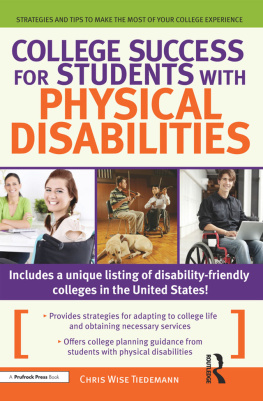
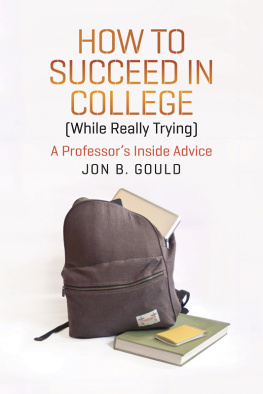
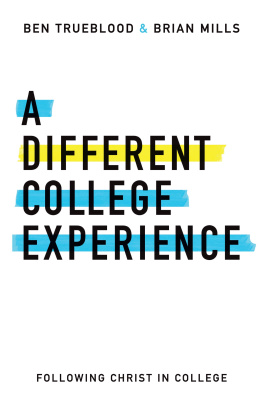
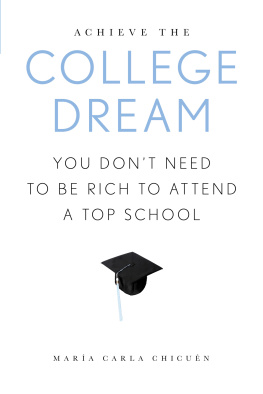
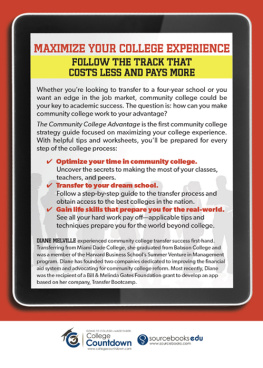


 There are no teachers in college! A college professor is not a teacher, as strange as that sounds. Not only does she have a full professional life outside your classeswith research, university service, national conferencesbut she likely doesnt think of herself as a teacher, even when teaching in the classroom. Professors consider themselves more as partners in learning. They want you to take charge of your education, to prepare independently, to ask bold questions, and to examine assigned materials with your own eyes. This doesnt mean youre alone. You have classmates, tutors, teaching assistants, and your professor, of course. But learning is now
There are no teachers in college! A college professor is not a teacher, as strange as that sounds. Not only does she have a full professional life outside your classeswith research, university service, national conferencesbut she likely doesnt think of herself as a teacher, even when teaching in the classroom. Professors consider themselves more as partners in learning. They want you to take charge of your education, to prepare independently, to ask bold questions, and to examine assigned materials with your own eyes. This doesnt mean youre alone. You have classmates, tutors, teaching assistants, and your professor, of course. But learning is now